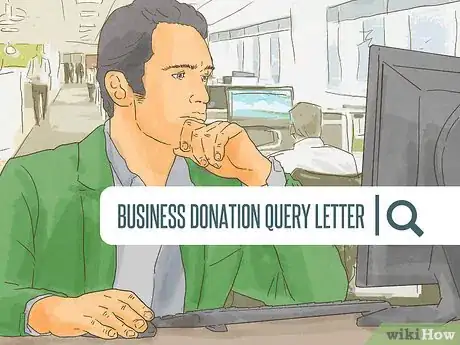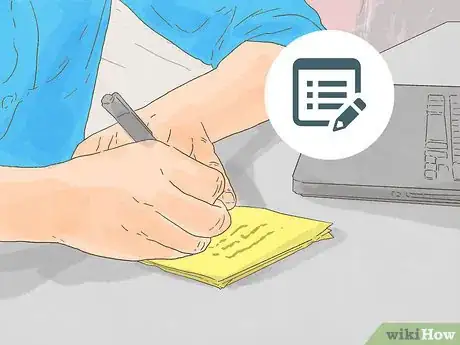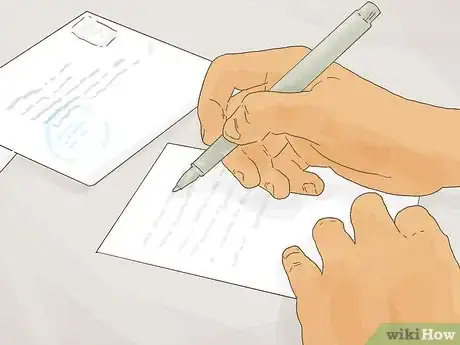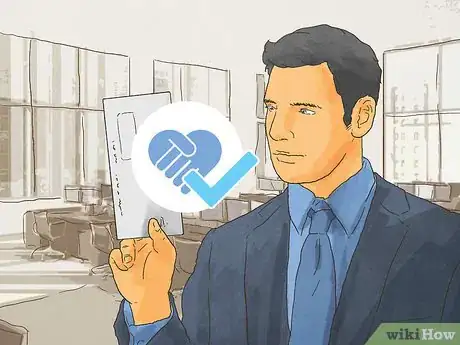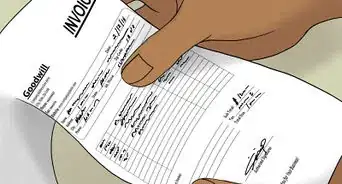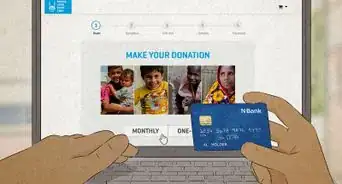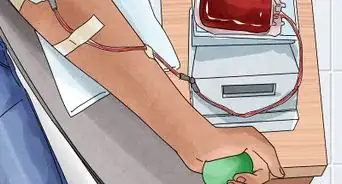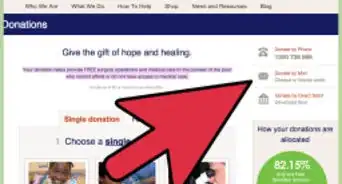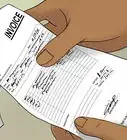This article was co-authored by Rob Wu and by wikiHow staff writer, Jennifer Mueller, JD. Rob Wu is the CEO of CauseVox, a digital fundraising platform designed for nonprofits. CauseVox works to help do-gooders raise more money with less effort. Rob has raised over $200,000 for his own nonprofit crowdfunding projects, and his work has been recognized by CNN, Christian Science Monitor, and the Wall Street Journal.
This article has been viewed 28,197 times.
Whether you work for a nonprofit or are just trying to raise money for a little league team or a school fundraiser, asking for donations can be an intimidating prospect. Asking businesses may seem even more intimidating, especially if you think your approach should be different than the way you ask individuals. But in reality, you should ask businesses for donations the same way you would ask individuals. Tailor your approach to the person you're asking, craft a formal letter, and meet with them in person to discuss your project and the reasons their business should donate.[1]
Steps
Developing Your Approach
-
1Decide which businesses you want to ask. The businesses you want to ask for donations are going to depend on the type of charity or other project you're raising money for. Focus on businesses that would benefit in some way from the donation.[2]
- Giving the business a good reason to donate makes it more likely that they will do so. For example, if you're raising money for a local little league team, focus on small businesses that are owned by people who live in your community, so they can get some advertising out of the sponsorship.
-
2Do your research. Before you even begin to approach a business for donations, you must learn all you can about the business and the types of organizations to which that business normally donates.[3]
- Learn more about the business itself and what it offers to the community, so you can determine what benefits the donation would offer to the business.
- If the business has a website, you may be able to find out more about the business and its donation strategies and policies there. For small local businesses, do a general internet search for local news websites or community interest blogs.
Advertisement -
3Identify the individual in charge of business donations. If you send a generic solicitation for donations, it likely will get thrown in the trash and never read. To make sure the business takes your request seriously and considers it, address your request to a specific person.[4]
- If you're approaching a larger corporation, you typically can find the name of this person by visiting the corporation's website or calling a general business information number.
- With small, locally owned businesses, there may not be a specific person (other than the owner) who is in charge of donations. Just call or stop by the business and ask.
-
4Adapt your approach to the individual. Once you have the name of someone who is in charge of the donations for the business, do some research on them. Assume their personal opinion will hold some sway on whether the business makes a donation.[5]
- For example, suppose you are raising funds to build a new no-kill animal shelter in your community. If you find out the person in charge of donations for a business adopted three dogs from a shelter, you can appeal to their love of animals to stoke their interest in your project.
-
5Offer something in return. When you're approaching a business to ask for a donation, think like a business rather than thinking like a charitable individual. Businesses don't donate to organizations or charitable projects for entirely altruistic reasons.[6]
- Typically, a business will make a donation because they want to improve their image or standing in the community and ultimately attract more customers. Look for ways in which a donation to your organization or project could accomplish this.
- For example, if you're seeking donations for a little league team, you may offer a sponsorship package that includes placing the business's logo on the kids' uniforms. This provides the business with advertising and also encourages the families of kids on the team to shop at that business.
-
6Practice your approach. If you want to get a business donation, you typically want to present your request in person. It typically is much more difficult for someone to decline a donation request when that request is made in person.[7]
- Craft a short speech lasting a couple of minutes, and memorize it. Practice in the mirror or in front of friends. They can give you pointers to help improve your delivery.
- Practice your speech until giving it becomes second nature. When you speak to the business owner, you don't want it to sound like you're reciting something you've just memorized.
Composing a Letter
-
1Search for templates. Before you schedule a meeting with a business owner or representative to ask for a donation, send a letter (through mail or email) that introduces them to your organization or project and explains that you want to request a donation.[8]
- If you're not comfortable crafting a letter on your own, you can do a general internet search for sample letters or templates. Use them as guides for your own letter, but be careful copying them word-for-word – they may include information that doesn't apply to your situation.
- Search for "business donation query letter" or "nonprofit donation letter" and download or print several that you can use. That way you can compare and contrast to find the right wording for the needs of your particular project.
-
2Create an outline. Before you draft your letter, you can use a basic outline to organize your thoughts and make sure you're including all the information that is important for the reader to know before they consider making a donation.[9]
- Working from an outline rather than simply sitting down and writing your letter also will keep you from rambling and help ensure that your letter is direct and to the point.
- Business owners are busy. Don't write more than a page, and try to stick to the basic facts. You can persuade them once you meet them in person.
- Outline your letter even if you are planning on sending it as an email. You still want what you write to be concise and well-organized.
-
3Start with a query letter. A short, simple query letter lets the business owner or representative know a little about your nonprofit project, and that you are contacting them to solicit a donation. This way they aren't caught off guard.[10]
- Start your letter by introducing yourself, and include a sentence or two about your organization or project. Then state that you want the business to be involved. Explain how a donation could benefit that particular business.
- Use the information you gained from your research to include a personal appeal to the person who will be reading your letter.
- Close your letter by requesting a meeting to discuss the opportunity further, and thank the person for their time and consideration.
-
4Schedule a meeting. After you've sent your letter to the business, give the owner or representative a few days to read it and contact you on their own. If you don't hear from them within a week or so, call the business to follow up.[11]
- When you call the business, ask to speak to the person to whom you sent the letter. When speaking, be cordial. Explain who you are and ask them about the letter. Be cordial and let them know if the matter is time-sensitive.
- Try to schedule your meeting within a week or two of the time when you sent your letter. You want your project to remain fresh in the recipient's mind.
- If you sent your letter through email, it is appropriate so send another email (or simply reply to your original email) to follow up.
-
5Meet with the business owner or representative. When you show up at the business to pitch your organization or project and request a donation, be conservative and respectful. You want to come off as someone they can trust with their money.[12]
- At the meeting, deliver your prepared speech. Take any questions the business owner or representative might have. Stress the benefits donating to your cause will provide to the business.
- If you're asked any questions to which you don't know the answer, offer to find the answer and get back to them rather than hedging or making something up on the fly. Don't be afraid to say you don't know – a businessperson will appreciate your honesty and initiative to find the answer for them.
-
6Follow up with a prospect letter. After you've met with the business owner or representative, get their sponsorship pledge commitment in writing. Even if they wrote you a check at your meeting, you still want to get it in writing.[13]
- In your prospect letter, you want to outline the specifics regarding the amount of money the business has pledged to donate, and what they will get in exchange for that donation (such as advertising).
- Make a copy of your signed letter for your organization's records before you send it. Attach a copy of the business's check or a receipt for the business's donation to the letter.
- You can send this letter via email, but in most cases you'll also want to send a paper letter for records.
-
7Accept "no" graciously. You may run into a situation where the owner tells you that the business is not making any donations at this time. Thank them for their time and offer contact information in the event they change their mind.[14]
Making Connections
-
1Establish a social media presence. Social media pages can help you drum up support for your project or organization. You also can advertise the donations of businesses who have pledged their support.[15]
- Seek connections with local businesses that your research indicates are in tune with the goals for your project or your organization at large.
- Ask individual connections to point you to other businesses or organizations that might be interested in your ongoing projects.
-
2Create networking opportunities. Showing up at community events and making your presence known with local business organizations is a way to get your project or organization noticed without doing a lot of extra work.[16]
- Focus on community events or business networking functions that have something to do with your project or organization. For example, if you're raising money to build an animal shelter, you might go to community dog shows or talk to local pet stores and dog groomers.
- Don't hassle people for donations at an event – they'll feel as though you are putting them on the spot, and you'll leave a bad impression. Instead, simply tell them about your project or organization and offer to send them more information if they're interested.
-
3Seek out advice. People often love when they're treated like an expert and asked for advice. If your project or organization needs any assistance, or if you have a problem you can't figure out, asking a business leader is also a good way to drum up support.[17]
- For example, suppose you've asked a local real estate agent for advice on finding a suitable building for an animal shelter you want to build. The real estate agent points you to a few great locations. Let them know you still need donations. Since the agent has helped, they may now feel they have a vested interest in seeing your project succeed.
-
4Maintain a continuing relationship. Even if you were only soliciting a donation for a single, short-term project, keep in touch with the business owner or representative. This communicates that their donation is appreciated.[18]
- Send out an email newsletter updating everyone who donated on the progress of your project, or the status of your organization. Talk about your accomplishments and how the donations are being used.
- You also can send birthday or holiday cards to your donors to express appreciation. Treat your donors – both individuals and businesses – as though they are part of the family.
- Patronize the business and encourage others to do the same. Tell people to let the business owner know that you sent them.
Expert Q&A
-
QuestionHow do you politely ask for donations?
 Rob WuRob Wu is the CEO of CauseVox, a digital fundraising platform designed for nonprofits. CauseVox works to help do-gooders raise more money with less effort. Rob has raised over $200,000 for his own nonprofit crowdfunding projects, and his work has been recognized by CNN, Christian Science Monitor, and the Wall Street Journal.
Rob WuRob Wu is the CEO of CauseVox, a digital fundraising platform designed for nonprofits. CauseVox works to help do-gooders raise more money with less effort. Rob has raised over $200,000 for his own nonprofit crowdfunding projects, and his work has been recognized by CNN, Christian Science Monitor, and the Wall Street Journal.
Digital Fundraising & Crowdfunding Expert Don't focus on the sale. Asking for donations is similar to making a sale. Either way, you don't want to focus on the transaction. Instead, think about it as offering people an opportunity. It's also important to build rapport with the person you're asking. When you're talking to a prospective donor, ask them questions to try to figure out what makes them tick. What are they interested in? How do they like to spend their time? That will allow you to get to know them and make a better connection with them. From there, you can discover if their interests match up with the work you do at your nonprofit.
Don't focus on the sale. Asking for donations is similar to making a sale. Either way, you don't want to focus on the transaction. Instead, think about it as offering people an opportunity. It's also important to build rapport with the person you're asking. When you're talking to a prospective donor, ask them questions to try to figure out what makes them tick. What are they interested in? How do they like to spend their time? That will allow you to get to know them and make a better connection with them. From there, you can discover if their interests match up with the work you do at your nonprofit. -
QuestionHow do I ask a big company for donations?
 Rob WuRob Wu is the CEO of CauseVox, a digital fundraising platform designed for nonprofits. CauseVox works to help do-gooders raise more money with less effort. Rob has raised over $200,000 for his own nonprofit crowdfunding projects, and his work has been recognized by CNN, Christian Science Monitor, and the Wall Street Journal.
Rob WuRob Wu is the CEO of CauseVox, a digital fundraising platform designed for nonprofits. CauseVox works to help do-gooders raise more money with less effort. Rob has raised over $200,000 for his own nonprofit crowdfunding projects, and his work has been recognized by CNN, Christian Science Monitor, and the Wall Street Journal.
Digital Fundraising & Crowdfunding Expert Offer more than one option for participation. Once you determine that the company's interests line up with what you do, give them one or two options in terms of how they can participate. For instance, you might say, "Here's an opportunity where you can donate $1000 and have this impact or donate $5000 and have this other impact." Then, give them some time to think, and follow up about a week later.
Offer more than one option for participation. Once you determine that the company's interests line up with what you do, give them one or two options in terms of how they can participate. For instance, you might say, "Here's an opportunity where you can donate $1000 and have this impact or donate $5000 and have this other impact." Then, give them some time to think, and follow up about a week later.
References
- ↑ https://nonprofithub.org/fundraising/7-tips-on-asking-for-donations-its-intimidating-we-get-it/
- ↑ https://kaboom.org/resources/build_playground_toolkit/fundraising/getting_local_business_contribute
- ↑ https://nonprofithub.org/fundraising/7-tips-on-asking-for-donations-its-intimidating-we-get-it/
- ↑ https://knowhownonprofit.org/how-to/how-to-approach-local-businesses-for-donations
- ↑ https://www.youcaring.com/blog/2016/how-to-ask-donations
- ↑ https://kaboom.org/resources/build_playground_toolkit/fundraising/getting_local_business_contribute
- ↑ https://nonprofithub.org/fundraising/7-tips-on-asking-for-donations-its-intimidating-we-get-it/
- ↑ https://knowhownonprofit.org/how-to/how-to-approach-local-businesses-for-donations
- ↑ https://knowhownonprofit.org/how-to/how-to-approach-local-businesses-for-donations
- ↑ https://media.kaboom.org/docs/documents/pdf/Fundraising_sample_letter.pdf
- ↑ https://kaboom.org/resources/build_playground_toolkit/fundraising/getting_local_business_contribute
- ↑ https://kaboom.org/resources/build_playground_toolkit/fundraising/getting_local_business_contribute
- ↑ https://media.kaboom.org/docs/documents/pdf/Fundraising_sample_prospect_letter.pdf
- ↑ https://knowhownonprofit.org/how-to/how-to-approach-local-businesses-for-donations
- ↑ https://knowhownonprofit.org/how-to/how-to-approach-local-businesses-for-donations
- ↑ https://kaboom.org/resources/build_playground_toolkit/fundraising/getting_local_business_contribute
- ↑ https://nonprofithub.org/fundraising/7-tips-on-asking-for-donations-its-intimidating-we-get-it/
- ↑ https://kaboom.org/resources/build_playground_toolkit/fundraising/getting_local_business_contribute






